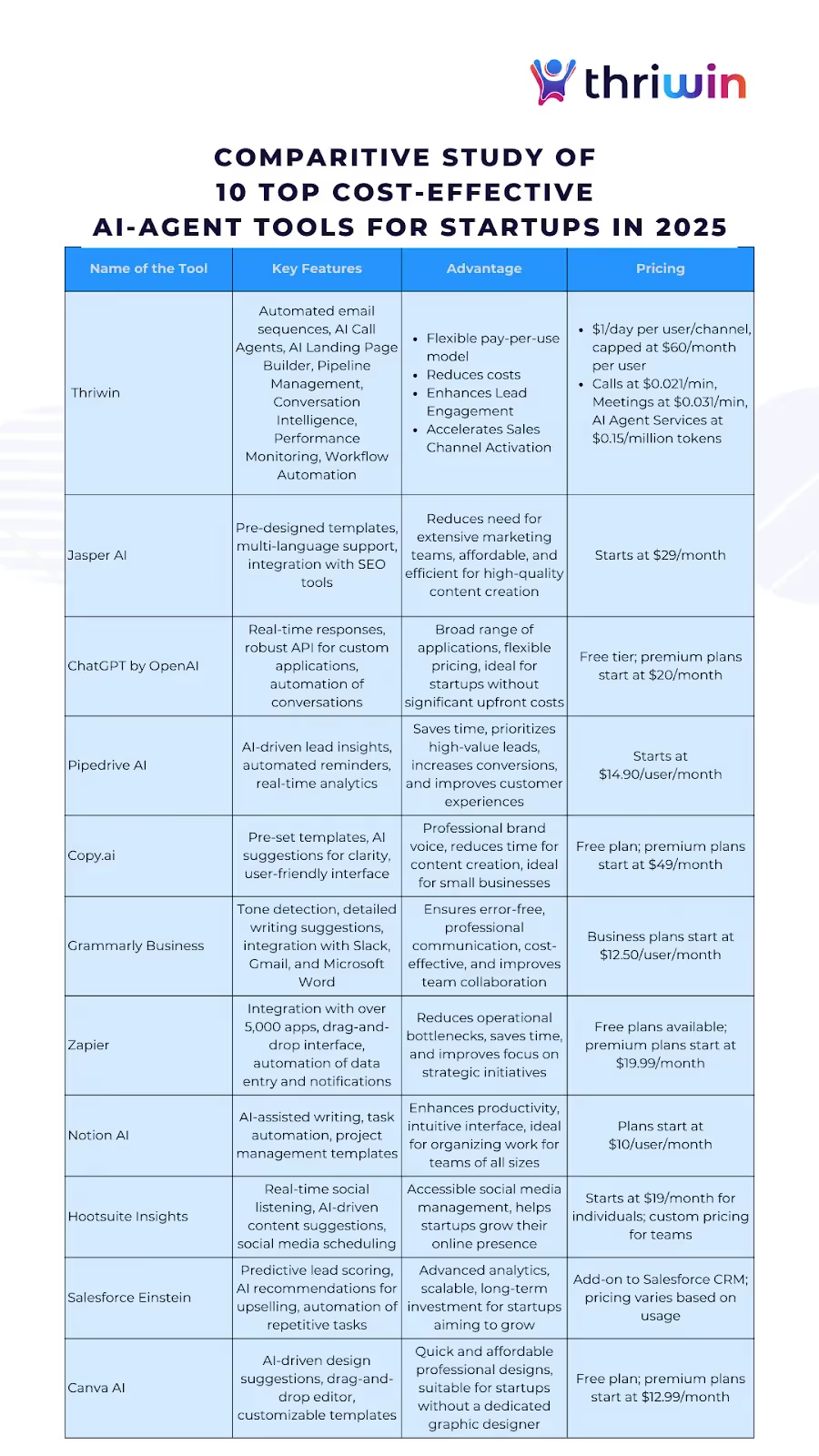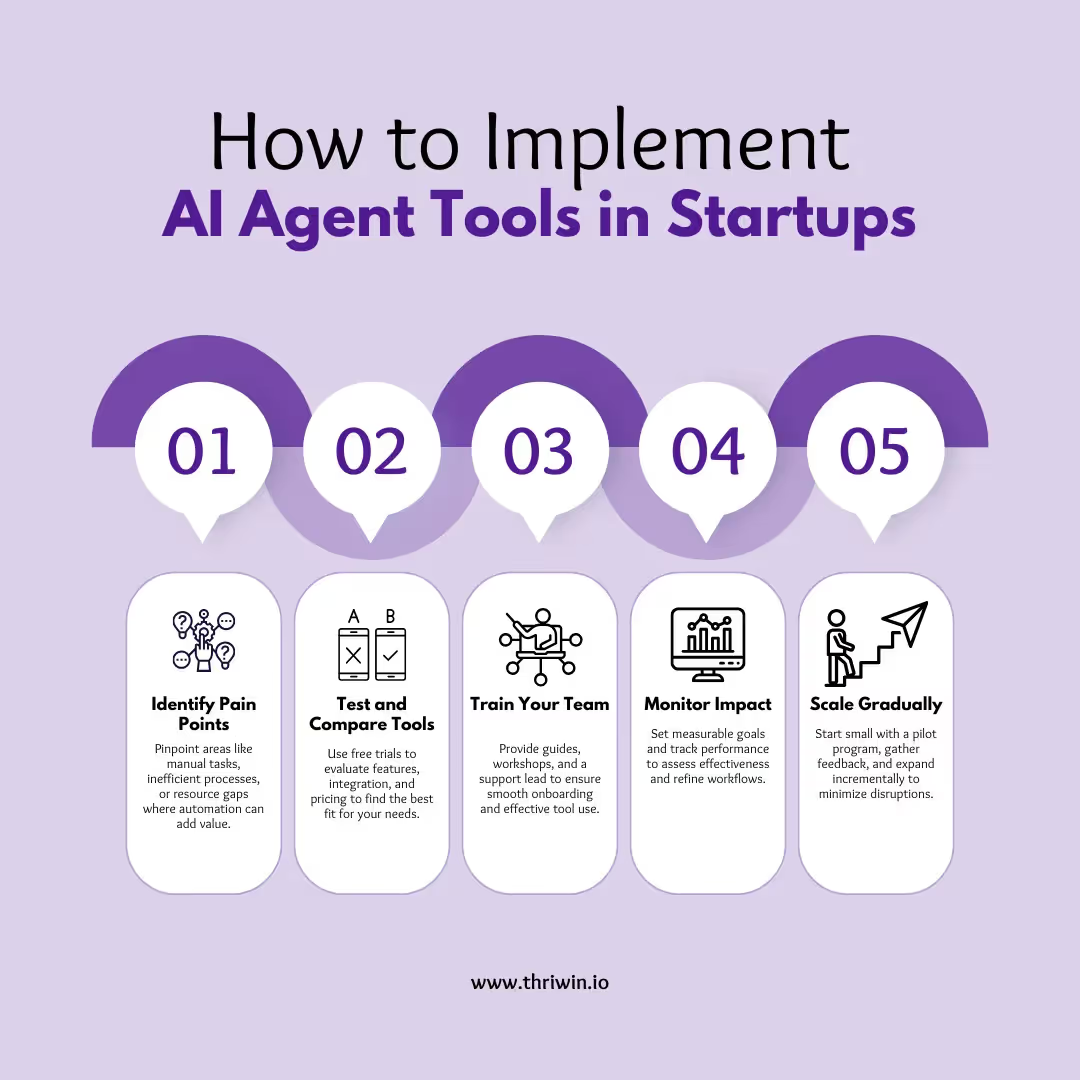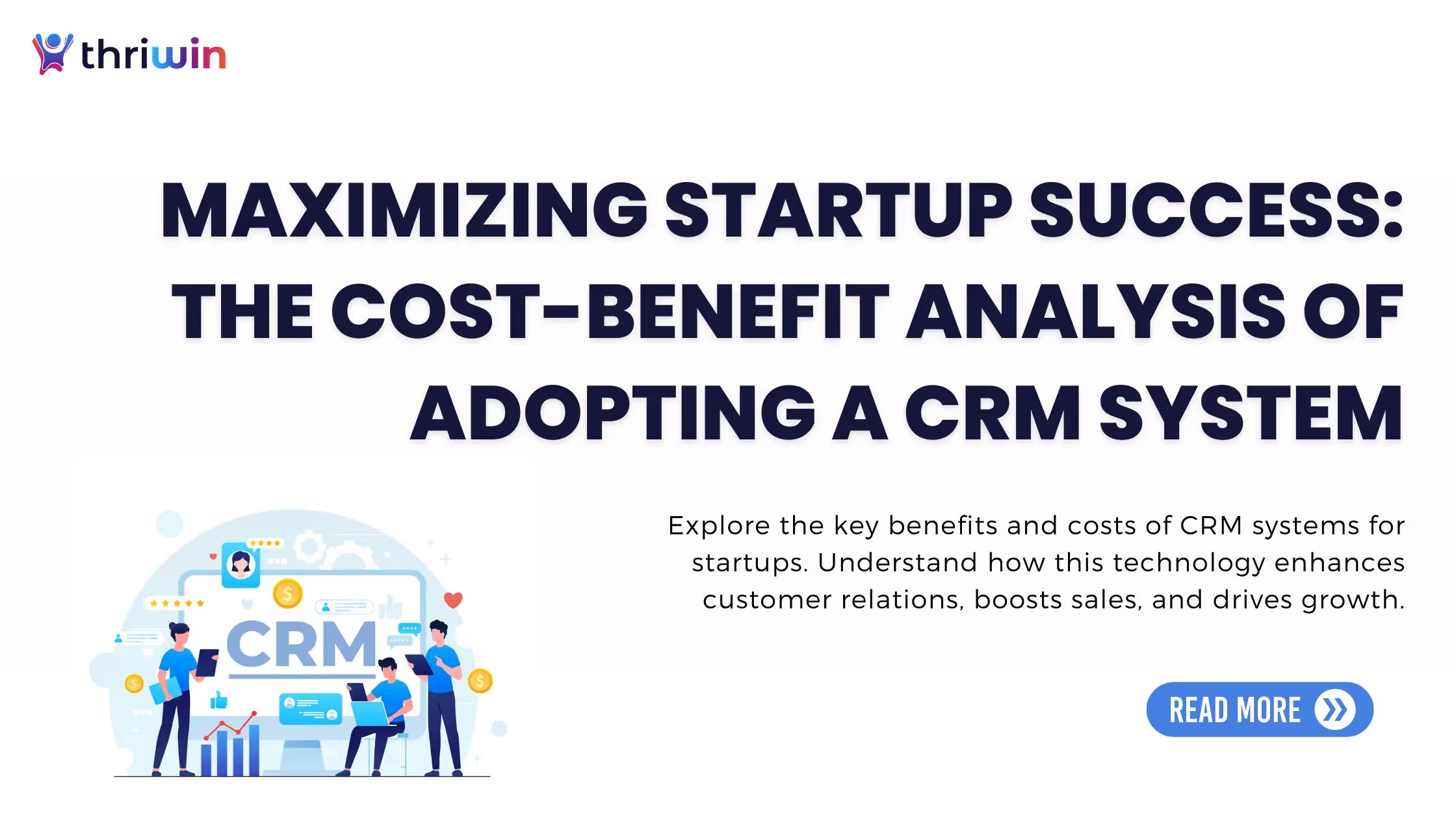Artificial intelligence (AI) will continue to be a driving force for startups in 2025. It helps automate processes, improve productivity, and streamline operations cost-effectively. Choosing the right AI tools for startups with tight budgets can significantly improve efficiency and growth. In this article, we will explore the top cost-effective AI agent tools designed to meet the needs of startups in 2025.
What Are AI Agent Tools?
AI agent tools are software programs driven by artificial intelligence designed to execute specific tasks without constant human input. These AI tools use highly advanced algorithms and machine learning processes to analyse data, learn from patterns, and make decisions autonomously. Over time, they improve their efficiency through continuous learning, adapting to new data and changing conditions.
Startups often use AI agent tools to automate repetitive, time-consuming tasks like scheduling, data entry, customer support, or email marketing. By handling these operational intricacies, AI agents free up teams to focus on critical strategic goals such as innovation, growth, and customer satisfaction.
For example:
- Customer Support Agents: AI tools like chatbots can respond to customer inquiries 24/7, providing instant support and reducing the workload of human agents.
- Data Analysis Tools: These AI agents process large datasets quickly, delivering actionable insights to guide decision-making.
- Marketing Automation: AI tools streamline marketing activities such as content development, email campaigns, and social media scheduling, increasing efficiency while reducing costs.
AI agent tools help startups minimise errors, enhance productivity, and achieve more with limited resources by improving workflow accuracy and consistency. These are critical advantages for small businesses aiming to scale rapidly.
How to Choose the Right AI Agent Tool
Selecting the right AI agent tool for your startup is a crucial decision that can significantly impact your efficiency and growth. Here are the key factors to consider, with a detailed explanation to guide your choice:
1. Affordability
Startups typically operate with limited budgets, so the cost of an AI tool should align with one’s financial limitations. Look for tools that offer flexible pricing options, free trials, or freemium options. However, affordability doesn’t mean compromising on quality. Evaluate the tool's features and offerings to ensure it delivers optimum value for its price.
2. Scalability
Your startup’s requirements will constantly evolve as it grows. An ideal AI agent tool should scale seamlessly with your business at different stages of the company. This means it should be able to manage increased workloads, integrate additional users, and accommodate more complex tasks without a drop in performance or requiring costly upgrades. Check if the tool offers advanced features that can be unlocked as your business expands.
3. Ease of Use
AI tools should simplify your operations, not complicate them. A user-friendly interface with intuitive navigation ensures your team can start using the tool without extensive training. Features like drag-and-drop functionality, clear instructions, and accessible dashboards make it easier for even non-technical team members to maximise the tool’s potential.
4. Integration Capabilities
Startups often bank on multiple tools and platforms to manage their operations. The AI agent tool you choose should integrate seamlessly with your existing operational systems, such as CRM software, marketing platforms, or communication apps. This compatibility ensures smooth data flow, reduces redundancy, and enhances the efficiency of your workflows. Tools with APIs or pre-built integrations are especially valuable.
5. Customer Support and Community
No tool is perfect, and technical issues or questions are bound to arise. Reliable customer support, whether through live chat, email, or phone, can make a huge difference in resolving problems quickly. Additionally, an active user community or forum can be an excellent resource for troubleshooting, tips, and discovering innovative ways to use the tool.
6. Customization Options
Every startup has unique needs, so a tool that allows you to customise the features and workflows is highly advantageous. Whether it’s adjusting the tool’s functionalities to align with your specific processes or tailoring reports to display relevant metrics, customisation ensures the tool works for you, not the other way around.
7. Security and Compliance
As AI tools often handle sensitive data, security is a critical factor. Look for tools with robust data encryption, compliance with industry standards (like GDPR or HIPAA), and a transparent privacy policy. This ensures your business and customer data remain safe.
8. Performance and Reliability
Before committing, assess the tool’s performance through reviews, demos, or trials. Evaluate its speed, accuracy, and uptime. A reliable AI tool ensures that your operations remain smooth and uninterrupted, avoiding costly downtime.
Top Cost-Effective AI Agent Tools for Startups in 2025
AI tools have revolutionised startups' operations, allowing them to automate tasks, improve efficiency, and save costs. In 2025, startups will continue to rely on these technologies to scale quickly and effectively. Below is an in-depth look at the top cost-effective AI agent tools for startups and their key features, pricing, and benefits.

Overview: Thriwin is a pay-per-use sales CRM designed explicitly for B2B startups. Unlike traditional CRMs with fixed subscription costs, Thriwin offers a flexible model that allows you to pay only for the services you use. It empowers startups to manage sales pipelines, generate leads, and automate outreach while controlling costs.
Key Features:
- Automated Email Sequences for AI-driven personalisation and scalable outreach.
- AI Call Agents & Power Dialer to improve efficiency and cut SDR costs by up to 80%.
- AI Landing Page Builder to design SEO-friendly, high-converting pages without coding.
- Pipeline Management for a unified view to optimise and close deals faster.
- Conversation Intelligence to record calls, generate notes, and offer actionable insights.
- Performance Monitoring with real-time tracking of team and individual metrics.
- Workflow Automation to streamline tasks and save up to 25 hours per week.
- Flexible pricing means you only pay for the services you use, avoiding fixed costs.
Pricing: Thriwin offers a pay-per-use model with no fixed fees, ensuring startups only pay for the services they utilise. $1/day per user, per channel, only for the days you use, plus enjoy a monthly cap of $60 per user. Use-based event charges are as follows: Calls start at $0.021 per minute, Meetings at $0.031 per minute, and AI Agent Services at $0.15 per million tokens.
Why Startups Love It: Startups appreciate Thriwin for its ability to rapidly activate sales channels without the delays associated with hiring and training human resources. The platform's AI-driven approach ensures consistent quality in outreach across multiple channels, enhancing lead engagement and conversion rates. Additionally, Thriwin's flexible, usage-based pricing model eliminates high fixed costs, making it economical for startups aiming to scale efficiently.
Overview: Jasper AI is an AI-powered content creation platform that helps startups generate high-quality blogs, social media posts, marketing copy, and email content. Its versatility and ease of use make it a favorite among marketing and content teams.
Key Features:
- Pre-designed templates for various types of content, like blog posts, advertisements, and social media captions.
- Multi-language support for global outreach.
- Integration with tools like Surfer SEO for search engine optimization, one customization matches your brand's voice.
Pricing: Plans start at $29 per month, with options for more advanced features at higher tiers.
Why Startups Love It: Jasper AI’s affordable pricing, combined with its efficiency in content generation, reduces the need for extensive marketing teams. Startups can produce professional-grade content quickly, freeing up resources for other priorities.
2. ChatGPT by OpenAI
Overview: ChatGPT is a versatile conversational AI tool that can handle customer inquiries, generate creative content, assist in brainstorming, and even provide coding help. It’s an all-in-one solution for startups needing AI-powered assistance.
Key Features:
- Real-time responses for customer support and engagement.
- A robust API for integrating AI capabilities into custom applications.
- Options for generating ideas, drafting documents, and automating conversations.
Pricing: The free tier is limited; premium plans start at $20 monthly.
Why Startups Love It: With a flexible pricing model and a broad range of applications, ChatGPT is ideal for startups looking to implement AI solutions without significant upfront costs.
3. Pipedrive AI
Overview: Pipedrive AI enhances sales processes by automating tasks like lead generation, tracking, and follow-ups. It integrates seamlessly with CRM systems, making it a significant tool for managing customer relationships efficiently.
Key Features:
- AI-driven insights to prioritize high-value leads.
- Automated reminders for follow-ups and pipeline updates.
- Real-time analytics to monitor team performance and sales trends.
Pricing: Plans start at $14.90 per user per month, with advanced features available in higher tiers.
Why Startups Love It: Pipedrive AI saves time and helps sales teams concentrate on nurturing leads, increasing conversions, and improving customer experiences.
4. Copy.ai
Overview: Copy.ai is an AI writing assistant that helps startups create product descriptions, email templates, ad copy, and more. It’s designed to reduce the time and effort required for content generation.
Key Features:
- Pre-set templates for marketing, sales, and customer engagement.
- AI suggestions for improving copy clarity and impact.
- User-friendly interface that requires no previous technical expertise.
Pricing: Free plans are available with basic features; premium plans start at $49 monthly.
Why Startups Love It: Copy.ai enables startups to maintain a professional and consistent brand voice and tone across multiple channels, making it a favorite among small businesses with limited resources.
5. Grammarly Business
Overview: Grammarly Business uses AI to refine written communication by checking grammar, tone, clarity, and conciseness. It ensures that teams produce professional-quality content, from emails to reports.
Key Features:
- Advanced tone detection to align communication with audience expectations.
- Detailed writing suggestions to improve readability and effectiveness.
- Integration with tools like Slack, Gmail, and Microsoft Word.
Pricing: Business plans start at $12.50 per user per month.
Why Startups Love It: Grammarly Business is cost-effective and supports team collaboration by ensuring all communication is error-free and polished, which is critical for building credibility.
6. Zapier
Overview: Zapier automates workflows by connecting various apps and services, eliminating the need for manual repetitive tasks. It’s ideal for startups that rely on multiple tools to manage their operations.
Key Features:
- Supports integration with over 5,000 apps, including Salesforce, Google Sheets, and Slack.
- Simple drag-and-drop interface for building automation workflows.
- Automates data entry, notifications, and reporting processes.
Pricing: Free plans are available for essential use; premium plans start at $19.99 monthly.
Why Startups Love It: Zapier reduces operational bottlenecks and saves valuable time, enabling startups to focus on strategic initiatives.
7. Notion AI
Overview: Notion AI is an advanced productivity tool that automates documentation, project management, and team collaboration tasks. It is integrated with Notion’s workspace platform, making it a one-stop solution for organizing work.
Key Features:
- AI-assisted writing and brainstorming for notes and documents.
- Task automation for streamlined workflows.
- Templates for project management and knowledge sharing.
Pricing: Plans start at $10 per user per month.
Why Startups Love It: Notion AI's intuitive interface and wide range of features make it accessible to teams of all sizes, enhancing productivity without the steep learning curve.
8. Hootsuite Insights
Overview: Hootsuite Insights uses AI to monitor social media trends, track engagement, and schedule posts, allowing startups to maintain an active online presence.
Key Features:
- Real-time social listening to track brand mentions and competitor activity.
- AI-driven content suggestions based on trending topics.
- Easy scheduling and maintenance of social media posts across platforms.
Pricing: For individuals, plans start at $19 per month; custom pricing is available for teams.
Why Startups Love It: Hootsuite makes social media management accessible, even for startups with limited marketing resources, helping them grow their online audience effectively.
9. Salesforce Einstein
Overview: Salesforce Einstein is an AI-powered platform that provides predictive analytics and automation for CRM processes. It helps startups make data-driven decisions and streamline customer interactions.
Key Features:
- Predictive lead scoring to prioritize potential customers.
- AI-powered recommendations for upselling and cross-selling.
- Automation of repetitive CRM tasks like data entry.
Pricing: Available as an add-on to Salesforce CRM plans; pricing varies based on usage.
Why Startups Love It: Salesforce Einstein’s advanced analytics and ability to scale make it a long-term investment for startups aiming to grow their customer base.
10. Canva AI
Overview: Canva AI simplifies graphic design with AI-powered suggestions, templates, and editing tools. It’s perfect for creating marketing and sales collateral, social media designs, and presentations.
Key Features:
- AI-driven design suggestions for faster creation.
- Drag-and-drop editor for ease of use.
- Thousands of customizable templates for various use cases.
Pricing: Free plan available; premium plans start at $12.99 monthly.
Why Startups Love It: Canva AI enables startups to create professional-quality designs quickly and affordably, even without a dedicated graphic designer.
How to Implement AI Agent Tools in Startups
Implementing AI agent tools in your startup requires a strategic approach to ensure the tools align with your business objectives and deliver optimum results. Here’s a detailed outline to help you integrate these tools successfully:
1. Identify Pain Points
Before adopting any AI tools, take a step back and assess the business areas that could benefit most from automation. Common pain points for startups include:
- Time-consuming manual work (e.g., data entry, scheduling, or customer inquiries).
- Inefficient processes in sales, marketing, or operations.
- Limited resources for content creation or social media management.
- Data analysis and reporting that require significant effort.
By pinpointing these challenges, you can choose tools tailored to your business’s unique needs, ensuring a higher return on investment.
2. Test and Compare Tools
Once you’ve identified areas for improvement, research multiple AI tools that cater to your requirements. Most AI solutions offer free trials or demo versions—take advantage of these to:
- Test usability and features.
- Evaluate how smoothly the tool integrates with your existing systems (e.g., CRM, project management software, or communication platforms).
- Compare pricing options to ensure they align with your budget plan.
Testing multiple tools allows you to make an informed call and choose the one that provides the best balance of functionality, ease of use, and affordability.
3. Train Your Team
Introducing new tools necessitates a learning phase for your team. Ensure that employees understand how to use the tools effectively by:
- Providing access to user guides, tutorials, or training resources offered by the tool provider.
- Organizing workshops or team sessions to demonstrate the tool’s functionality.
- Assigning a point of contact (e.g., a team leader or tech expert) who can help troubleshoot and answer queries.
A well-trained team ensures the tools are used to their full potential, leading to smoother adoption and better results.

4. Monitor Impact
Once the tools are in use, it’s essential to regularly track their performance to determine whether they’re meeting expectations. Set measurable goals for each tool, such as:
- Reducing time spent on repetitive tasks.
- Improving lead conversion rates in sales.
- Increasing social media engagement through AI-driven content scheduling.
Use the tools' analytics and reporting features to evaluate their effectiveness. If a tool isn’t delivering the desired results, consider optimizing its usage, reevaluating your workflows, or testing alternative solutions.
5. Scale Gradually
When implementing AI tools, it’s wise to start small rather than overhaul multiple processes simultaneously. For example:
- Begin with a pilot program for one department or team.
- Use the tool for a single function, such as automating customer support or generating content.
- Collect feedback from the initial users and refine your approach before rolling it out company-wide.
Gradually scaling up ensures smoother transitions, minimizes disruptions, and allows you to adjust as needed based on real-world use cases.
Final Thoughts:
Choosing the right AI tools can make or break a startup's growth trajectory, especially in a competitive and resource-conscious environment. Each tool on this list offers unique advantages, but the key lies in understanding your business's specific needs. While platforms like Jasper AI and ChatGPT excel in creative tasks and automation, tools like Pipedrive AI and Salesforce Einstein shine in streamlining sales operations.
What sets Thriwin apart, however, is its comprehensive approach to sales outreach and engagement, combined with a flexible pay-per-use pricing model. Unlike traditional solutions that burden startups with fixed costs, Thriwin adapts to your usage, ensuring high ROI with minimal investment. Its AI-first design, pre-set templates, and workflow automation make it a standout choice for startups looking for scalability without compromise.
Ultimately, the best tool is the one that aligns with your goals and integrates seamlessly into your operations. With options catering to diverse needs, startups in 2025 can leverage these AI agent tools to boost efficiency, reduce costs, and achieve sustainable growth. Whether you choose a specialized solution or a versatile platform like Thriwin, the future of business automation is undoubtedly AI-driven.
Streamline Your Sales with Thriwin
Why does building a high-performing sales process feel like an uphill battle? As a founder, you’ve seen the endless struggle to generate quality leads, execute timely follow-ups, and create campaigns that convert—all while managing tight budgets and limited resources.
Thriwin addresses this head-on. From AI-led calls and email outreach to landing page creation, our platform takes charge of lead generation with precision. Our AI agents don’t stop there—they manage follow-ups, track context across touchpoints, and provide insights that make every interaction meaningful. Your team can finally focus on closing deals, not chasing them.
Say goodbye to wasting time on manual tasks and overspending on talent that doesn’t scale. Thriwin offers a streamlined, cost-efficient sales process designed to match the pace of your ambitions. Why settle for chaos when efficiency is just one step away?
FAQs
What are AI agent tools?
AI agent tools are software applications that use artificial intelligence to automate work and improve productivity.
Why are AI tools necessary for startups?
AI tools help startups save time, reduce costs, and improve efficiency by automating repetitive processes and offering valuable insights.
Are AI tools expensive?
Many AI tools offer budget-friendly pricing plans; some even have free versions, making them accessible for startups.
Can AI tools integrate with other software?
Yes, most AI tools are designed to integrate with popular systems, such as CRM platforms, email marketing tools, and project management software.
How do I choose the right AI tool for my startup?
Before deciding, consider your business needs, budget, scalability, and the tool’s compatibility with your existing systems.
%201.svg)



.webp)


